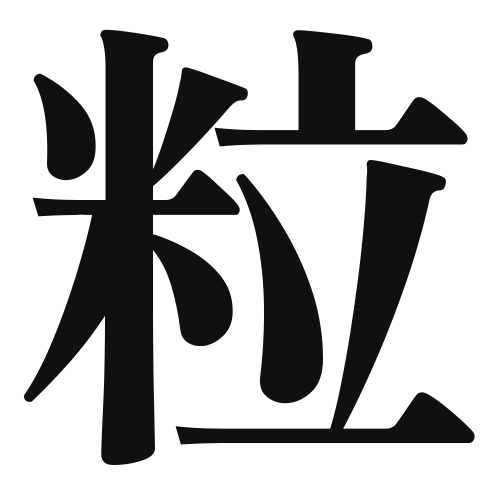1. Overview of Meaning
The kanji “粒” (pronounced “tsubu”) means “grain” or “particle.” It refers to small, discrete units of matter, often used to describe things like grains of rice, beads, or any small, round objects.
2. Formation and Radical
Formation of the Kanji: The kanji “粒” is a phonetic-ideographic character (形声文字). It combines the radical for “grain” (禾) on the left, which indicates its meaning related to small particles, and the phonetic component “立” (pronounced “ritsu”), which contributes to its pronunciation.
Radical: The radical of “粒” is 禾 (he), which is associated with plants and grains.
3. Examples of Usage
Common Words and Phrases: Some common words that include “粒” are:
- 粒子 (りゅうし, ryūshi) – “particle”
- 粒米 (つぶこめ, tsubukome) – “grains of rice”
Example Sentences in Daily Conversation:
- このお米は粒が大きいです。 (このおこめはつぶがおおきいです。) – “This rice has large grains.”
- 砂粒が目に入った。 (すなつぶがめにはいった。) – “A grain of sand got into my eye.”
4. Synonyms and Antonyms
Similar Kanji: A similar kanji is “粒子” (りゅうし, ryūshi), which means “particle.” While both refer to small units, “粒” often refers to larger, visible grains, while “粒子” can refer to microscopic particles.
Antonyms: An antonym could be “塊” (かたまり, katamari), which means “lump” or “mass,” indicating a larger, undifferentiated quantity of material.
5. Cultural and Historical Background
Relation to Japanese Culture: In Japanese culture, rice is a staple food, and the concept of “粒” is significant in discussing the quality and type of rice. The size and shape of rice grains can affect cooking and taste.
Proverbs and Idioms: One common saying is “粒より団子” (つぶよりだんご, tsubu yori dango), which means “a dumpling is better than a grain,” emphasizing the value of substance over appearance.
